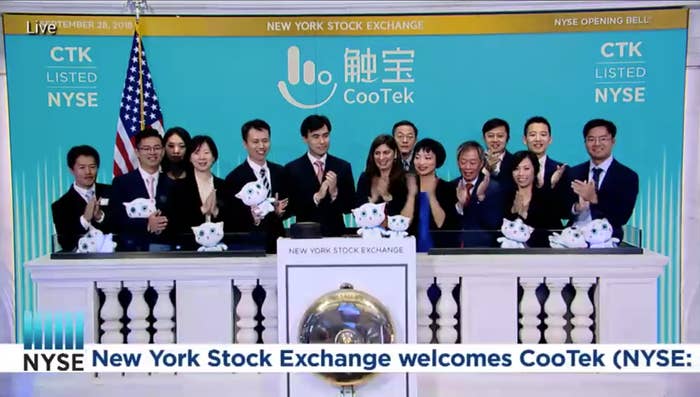
Google is banning CooTek, a publicly traded Chinese app developer, from its Play store and ad platforms after BuzzFeed News and a security company provided evidence that its apps continued to bombard users with disruptive ads even after the company claimed it had stopped the behavior.
CooTek, based in Shanghai, is traded on the New York Stock Exchange and had hundreds of Android apps in the Play store, including the popular TouchPal keyboard apps. As of this writing, more than 60 of its apps have been removed from the Play store, and CooTek is now completely banned from Google’s lucrative ad platforms. A Google spokesperson said more removals will follow in the Play store as it continues its enforcement action.
"Our Google Play developer policies strictly prohibit malicious and deceptive behavior, as well as disruptive ads. When violations are found, we take action,” a Google spokesperson told BuzzFeed News.
CooTek issued a press release after this story was published to say its apps had been "temporarily disabled" from Google's platforms. CooTek acknowledged that its "ability to attract new users and generate revenue from Google Admob may be adversely affected. The actions taken by Google will not affect CooTek's existing users or their ability to use the apps."
CooTek is the second major Chinese app developer to receive a ban by Google this year. In April, all apps from Do Global, a developer with half a billion installs and ties to e-commerce giant Baidu, were removed after BuzzFeed News revealed the company was committing ad fraud and violating other Google policies. Last year, Google also removed hugely popular apps from Chinese companies Cheetah Mobile and Kika Tech after BuzzFeed News reported on them engaging in ad fraud.
CooTek’s path to a ban began last month when security company Lookout publicly revealed that 238 of the company’s apps contained an adware plug-in, BeiTaAd. This plug-in triggered disruptive ads when a phone was asleep, locked, or in other cases when a CooTek app was not in use.
“While out-of-app ads are not particularly novel, those served by this plugin render the phones nearly unusable,” wrote Kristina Balaam, a security intelligence engineer with Lookout, in a blog post revealing her findings.
She said users “have reported being unable to answer calls or interact with other apps, due to the persistent and pervasive nature of the ads displayed.”
In response, CooTek apologized and said it removed the plug-in and uploaded new, clean versions of its apps. Google accepted those apps back into the Play store, effectively confirming they were safe.
But evidence obtained by BuzzFeed News and Lookout showed that 58 of the updated apps contained old and/or new code that helped them continue the same malicious ad activity. The BeiTaAd plug-in was gone, but the ads remained, according to Lookout’s review of the updated apps in question.
“Fifty-eight apps had this new functionality added,” Balaam told BuzzFeed News in an interview. At some point in June, CooTek again updated its apps and removed the offending code and functionality, according to Lookout. But the damage was done.
In multiple email messages prior to the ban, CooTek spokesperson Mina Luo denied its updated apps engaged in malicious ad activity, and disputed Lookout’s new analysis. The company reiterated this denial in its press release.
“Again, we confirm that there was NOT any re-engagement on the ad activity pointed out by Lookout on any of the versions which we updated,” Luo said in an earlier message.
“Our engineers re-used some of the previous code frameworks in question in order to implement normal features such as reminding users to drink water or to exercise. It didn’t re-engage any malicious ad activity and there are no disruptive ads in our updated versions."
Luo said “the findings claimed by Lookout this time are lack of evidence and the logic is not convincing.”
However, Google has now confirmed those findings.
App development and monetization is the core of CooTek’s business. This action by Google will likely have a significant impact on its revenue outside of China, though its iOS apps remain available in Apple’s App Store; no issues have been reported with those versions. CooTek recently reaffirmed its commitment to global markets by opening a new office in Santa Clara, California, in March.
UPDATE
Added information from CooTek press release.
